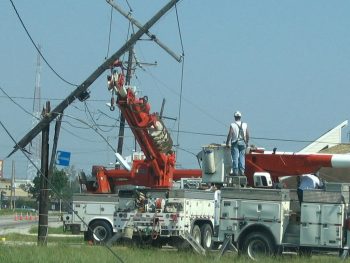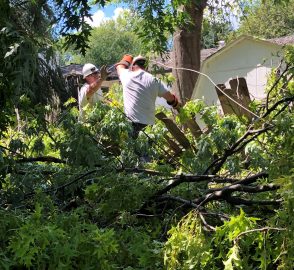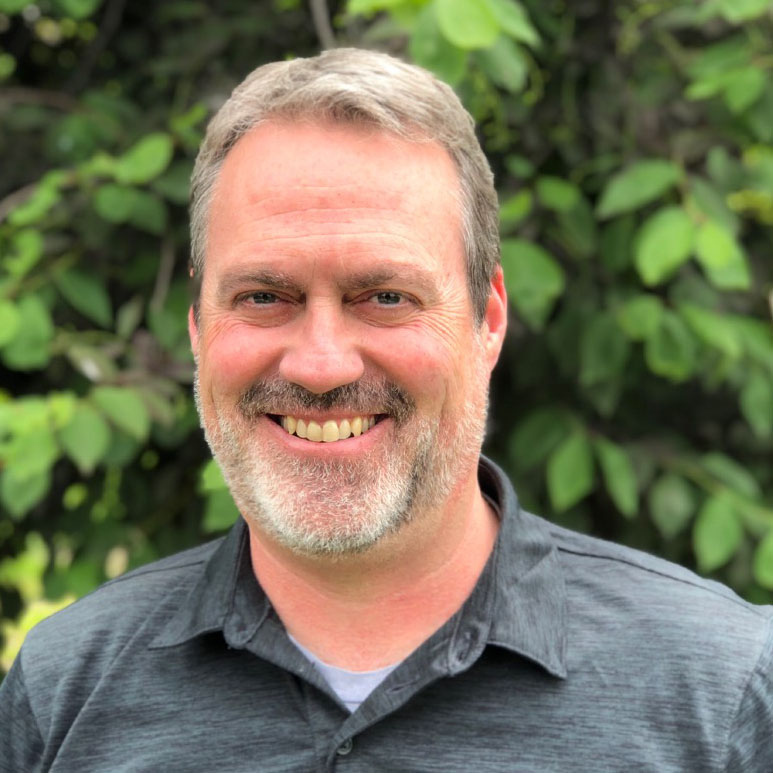The give and take of mutual aid

Storms with damaging winds or heavy snow can cause limited, short-term power outages. But sometimes a storm or other natural disaster knocks out power to enough customers that the affected utility needs outside help to bring power back online. That’s when it puts out a request for mutual aid.
OPPD has been on both sides of mutual aid numerous times. On the “give” side, OPPD has sent crews as far as New York City and Tampa, Florida. Crews have also traveled to Kansas City and the Twin Cities, and they’ve helped other utilities in Nebraska, as well.
And when it comes to the “take” side, OPPD has been helped by utility crews from as far away as Alabama. Those crews came to Nebraska in June 2017 after two tornadoes struck the Bellevue area, knocking out power to 76,500 customers. OPPD received mutual aid most recently in 2021 after a July 10 storm knocked power out to more than 188,000 customers, the largest outage in the utility’s history.
When outage numbers are high and the damage is more severe than that caused by typical storms, outside help is essential to safe and timely restoration.
What is mutual aid?
Mutual aid is an agreement through which utilities offer their restoration services after natural disasters strike and cause widespread power outages. When restoration help is necessary, the utility that needs the help puts out a request for assistance through mutual aid networks.
Recently, OPPD provided assistance at the request of Xcel Energy. OPPD sent four line crews to St. Paul, Minnesota, on April 2 to help restore power after an early spring snowstorm knocked power out to more than 70,000 customers.

It was a shorter trip than usual for the OPPD crews. They spent less than 24 hours there before Xcel released them from service. But sometimes, as was the case with Hurricane Katrina in 2005, crews spend more than two weeks away.
A typical mutual aid trip involves working single outages, as opposed to large-scale outages. That means the outside crews work isolated outages, like individual homes, one at a time. That process takes longer than restoring power on the circuit level.
In storm restoration, utilities work to bring the largest number of customers back online first, as these are typically circuit-level outages. In that situation, a repair to the circuit can bring 1,000 or more customers back online at the same time, depending on the population density the circuit feeds.
The host utility pays the workers who respond and provide aid, finds lodging for them and reimburses their meal expenses.
Mutual aid agreements
OPPD has agreements with several mutual aid groups, some from Nebraska and some regional.
The largest utilities in the country belong to the greater National Mutual Assistance Resource Team. Within that group are regional groups including the Midwest Mutual Assistance Group (MMAG), to which OPPD belongs.

Other organizations OPPD belongs to include the Public Power Mutual Aid Network, which is tied to the American Public Power Association (APPA), and Nebraska Mutual Aid.
Eli Schiessler, manager of Distribution Services at the Elkhorn Service Center, said crews from each of OPPD’s service centers serve on the mutual aid crews.
Four crews respond, each consisting of three linemen. In addition to those crews, OPPD sends along two mechanics, a field supervisor and a safety representative.
The safety rep is a new addition to mutual aid response teams.
Bryan Bernhards, an injury prevention specialist and former lineman at OPPD, said including safety in mutual aid responses makes sense.
Another set of eyes for safety
“Safety is huge in our company, so it should be going on the road, too, in these responses,” Bernhards said. “A safety representative works as an extra set of eyes looking out for everyone. Often, we are going down south after hurricanes, and it’s hot and sweaty and we are working in hard-hit areas.

“Plus, it is a different electrical system than what we are used to working on. The field supe (supervisor) has enough going on trying to coordinate everything, so we can assist them with whatever they need, such as helping crews determine the best route to their next assignment.”
Bernhards’ first trip as a safety rep was to Sioux Falls, South Dakota, in May 2022 after a wind storm. His second in that role later in the year for Hurricane Ian in Florida. He drove an OPPD van that was loaded with Gatorades, bottles of water and high protein snacks, which he would have distributed to crews as they worked.
“When you get down there, you don’t know where or when the next meal will be. And if you do need something, you can’t buy anything because where we are going” stores aren’t likely to be open, Bernhards said.
Helping visiting crews
Bernhards gave the example of a situation he encountered while on an out-of-state mutual aid deployment when he was a lineman.
“They had different voltages and didn’t tell us that, and we didn’t have the PPE (personal protective equipment) required to work on it,” Bernhards said. “Different utilities handle mutual aid differently. We have safety briefings with the crews we bring in, and we have a bird dog with them as they work.”
A bird dog is usually a former lineman or other employee who understands the how the host utility’s electric system works. OPPD often has retired linemen or supervisors work as bird dogs with mutual aid crews, for safety and operational reasons.
Jeremy Bryant, field supervisor in Transmission & Distribution, has been on a mutual aid trip to Baton Rouge, Louisiana. He said a number of people support the restoration crew members while they are gone. OPPD needs employees to fill in for the workers who are serving on the crews, and employees’ families often have to make adjustments and change plans when the employees leave on very short notice.
Mutual aid through the years
OPPD has been a part of mutual aid efforts since the early 1990s, though the responses were kept within the region.
APPA created a one-page mutual aid agreement that was developed along with the National Rural Electric Cooperative. OPPD’s original agreement with APPA dates back to 2000.

Mutual aid changed after Hurricane Sandy struck the East Coast in October 2012, leaving millions in 21 states without power. That massive storm made it clear that the industry needed a national response plan, in addition to regional plans.
APPA officials said Sandy was the impetus to set up a working group – the “Coalition of the Willing” – to revamp mutual aid responses. The group formed in 2013. The federal government wanted utilities and energy companies across the country to come up with plans for better and more coordinated responses than what was seen in the Sandy response.
The Public Power Mutual Aid Playbook was developed and presented to the Department of Energy in 2015. The playbook, among other things, created state coordinator roles to help determine needs and serve as a central contract during restoration events. Schiessler and Kurt Teten, manager of the Syracuse Center, serve as OPPD’s representatives.
Public power
Schiessler said most utilities, including OPPD, don’t have adequate staffing or enough resources for worst-case scenario storms, and that’s why these partnerships are essential to timely power restoration.
APPA officials agree.
“Electric power is absolutely essential,” said Jeff Haas, APPA’s acting president & CEO and senior vice president of membership and education. “And when you look at all the critical infrastructure sectors, every last one of them relies on the service we provide.”
APPA’s vast network of utilities ready and willing to help one another is “rooted in the public power spirit of neighbors helping neighbors,” Haas said.


Jason Kuiper joined OPPD as a communications specialist in 2015. He is a former staff writer and reporter at the Omaha World-Herald, where he covered a wide range of topics but spent the majority of his career covering crime. He is a graduate of the University of Nebraska at Omaha and has also appeared in several true crime documentary shows. In his free time he enjoys cooking, spending time with his wife and three children, and reading crime novels.
View all posts by Jason Kuiper >





